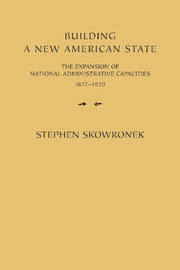Book contents
- Frontmatter
- Contents
- Preface
- Part I The state-building problem in American political development
- Part II State building as patchwork, 1877–1900
- Part III State building as reconstitution, 1900–1920
- Introduction: From patchwork to reconstitution
- 6 Reconstituting civil administration: economy, efficiency, and the repoliticization of American bureaucracy
- 7 Reconstituting the army: professionalism, nationalism, and the illusion of corporatism
- 8 Reconstituting business regulation: administrative justice, scientific management, and the triumph of the independent commission
- Epilogue: Beyond the state of courts and parties – American government in the twentieth century
- Notes
- Selected bibliography
- Index
7 - Reconstituting the army: professionalism, nationalism, and the illusion of corporatism
Published online by Cambridge University Press: 03 May 2010
- Frontmatter
- Contents
- Preface
- Part I The state-building problem in American political development
- Part II State building as patchwork, 1877–1900
- Part III State building as reconstitution, 1900–1920
- Introduction: From patchwork to reconstitution
- 6 Reconstituting civil administration: economy, efficiency, and the repoliticization of American bureaucracy
- 7 Reconstituting the army: professionalism, nationalism, and the illusion of corporatism
- 8 Reconstituting business regulation: administrative justice, scientific management, and the triumph of the independent commission
- Epilogue: Beyond the state of courts and parties – American government in the twentieth century
- Notes
- Selected bibliography
- Index
Summary
This is a time of organization. Great results are produced only by that. Individual effort, individual brillance, individual heroism accomplishes but little, except as it has an effect upon masses of men. Effective and harmonious organization is the moving power of the world today. We have lagged behind in the army until now; and now, I believe and trust, we take our place in the front rank of the organizations which are to control the effective action of the future … Days of trial for our country are to come, and I confidently believe that, when those days are upon us, the American people will look back to the inauguration of the General Staff, and will look back to the inauguration of a good spirit of brotherhood in arms pervading all branches of the American Army, as the beginning of a new day and the origin of an efficiency never known before in the defenders of our government and of our nation.
Elihu Root, First Annual General Staff Dinner, 1904Over the first two decades of the twentieth century, the American army was transformed from a standing contradiction operating within the state of courts and parties into a constituent part of a new bureaucratic state. Professionalism, nationalism, and corporatism – ideals as inextricably linked with the modernizing thrust of Progressive state building as economy and efficiency – heralded this reconstitution. Yet, the historicalstructural impasse that had developed in American army reform in the late nineteenth century called into question institutional power relationships throughout the governmental system and gave a significant twist to reform ideals.
- Type
- Chapter
- Information
- Building a New American StateThe Expansion of National Administrative Capacities, 1877–1920, pp. 212 - 247Publisher: Cambridge University PressPrint publication year: 1982
- 1
- Cited by



